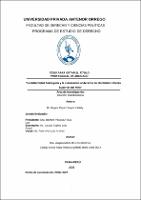La Maternidad Subrogada y la vulneración al derecho de Identidad e Interés Superior del Niño

View/
Download
(application/pdf: 5.969Mb)
(application/pdf: 5.969Mb)
Date
2022Author(s)
Reyes Reyes, Yeymi Yadaly
Metadata
Show full item recordAbstract
Este trabajo de investigación denominado “La maternidad subrogada y la
vulneración al derecho de identidad e interés superior del niño”, tiene como objetivo
general: analizar de qué manera la ausencia de regulación de la Maternidad
Subrogada, vulnera el derecho de Identidad e Interés Superior del Niño. La
investigación se ha desarrollado aplicando los métodos dogmático, funcionalista,
analítico, inductivo entre otros; el tipo de investigación según la técnica de
contrastación se trata de un estudio descriptivo; su diseño fue no experimental; su
técnica fue de observación documental, como instrumentos se usó fichaje de
materiales escritos.
Como resultado se ha concluido que la maternidad subrogada es una práctica
que viola el derecho de identidad e interés superior del niño por cuanto este no conoce
su identidad estática y por consiguiente no podrá desarrollar su identidad dinámica y
crecer en base a una verdad que la hace suya ya que no existe un límite a la salud
reproductiva asimismo al no estar regulado genera una afectación a los menores que
nacen bajo esta práctica.
Asimismo, se tiene que la práctica de la maternidad subrogada puede hasta seis
personas reclamar la paternidad de un recién nacido (la donante de óvulos, el donante
de esperma, la madre gestante, su pareja y la pareja comitente). Impidiendo al niño
conocer su origen e identidad, tal y como establece la Convención de Derechos del
Niño. This research work called ““Surrogate motherhood and the violation of the right
of identity and superior interest of the child““, has as a general objective: to analyze
how the absence of regulation of Surrogate Motherhood violates the right of Identity
and Superior Interest of the child. Little boy. The research has been developed by
applying the dogmatic, functionalist, analytical, inductive methods among others; the
type of research according to the contrast technique is a descriptive study; its design
was non-experimental; his technique was documentary observation, as instruments
was used recording of written materials.
As a result, it has been concluded that surrogate motherhood is a practice that
violates the right of identity and the child's best interests, since he does not know his
static identity and therefore will not be able to develop his dynamic identity and grow
based on a truth that makes it theirs, since there is no limit to reproductive health, and
since it is not regulated, it affects minors who are born under this practice.
Likewise, the practice of surrogate motherhood can up to six people claim
paternity of a newborn (the egg donor, the sperm donor, the surrogate mother, her
partner and the intended partner). Preventing the child from knowing her origin and
identity, as established by the Convention on the Rights of the Child.
Collections
- Derecho [477]

